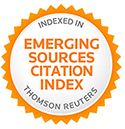Sismicidad de la región Carpatiana: Zona de Vrancea entre Ucrania, Rumania y Hungría
Resumen
El polígono de pronósticos complejos para la región Carpatiana ha sido creado para probar nuevos métodos y equipos, y su implementación forma parte de la práctica de investigaciones sismotectónicas en la región Transcarpatiana. El polígono consiste en una red de estaciones de régimen geofísico (RGS). El autor es uno de los analistas de la sismicidad del sector ucraniano de los Cárpatos. Esta sismicidad está determinada por terremotos locales y los terremotos fuertes subcorticales de la zona de Vrancea en Rumania. En este trabajo se estiman los parámetros más fundamentales que describen a los terremotos: energía sísmica E y clase de energía K=log (E) en una ventana de tiempo de 40 años (1961-2001). Nuestros resultados muestran que el SE1/ 2 trazado contra el tiempo, puede resultar un buen instrumento para entender la actividad de un terremoto local, aunque la forma del trazo sea fuerte bajo la influencia de acontecimientos extremos. También, hemos encontrado una correlación entre el momento sísmico M0 y la clase de energía K de los terremotos locales para la región Transcarpatiana.
Palabras clave
Texto completo:
PDFReferencias
AKI, K. and P. RICHARDS. 1983. Quantitative
Seismology: Theory and Methods.
Freeman & Company, San Francisco. 978 p.
ANDERSON, J. G. 1987. Strong Motion Seismology.
Reviews of Geophysics, Seismology
Supplement, U. S. National Report
to the International Union of Geology and
Geophysics, pp. 700-720.
ANDERSON, J. G.; BRUNE, J. N.; LOUIE, J.
N.; ZEND, Y.; SAVAGE, M.; YU, G.; CHEN,
Q. and D. DE POLO. 1994. Seismicity in the
Western Great Basin Apparently Triggered
by the Landers, California, Earthquake, 28
June 1992. Bulletin of the Seismological
Society of America. Vol. 84 (3): 863-
BRUNE, J. N. 1970. Tectonic stress and the spectra
of seismic shear waves from earthquake.
J. Geophys. Res. 75: 4997-5009.
GUTENBERG, B. and C. F. RICHTER. 1956.
Earthquake magnitude, intensity, energy,
and acceleration (second paper). Bulletin
of the Seismological Society of America.
V. 46: 105-145.
HUMPHREY, J. R. and J. G. ANDERSON. 1994.
Seismic source parameters from Guerrero
subduction zone, Bulletin of the Seismological
Society of America. Vol. 84 (6):
-1769.
KASAHARA, K. 1985. Earthquake mechanics.
Cambridge University Press, Cambridge.
p.
LATYNINA L.; T. VERBYTSKY and V. IGNATYSHYN.
Deformacionnykh processakh
v severo-vostochnoj chasti Karpato-
balkanskogo regiona (Deformation
Processis in Nort-East Part of Carpathian-
Balkan Region), Fizika Zemli, 4: 3-16.
Also in Physics of the Solid Earth, English
Translation, Vol. 31 (4): 281-293.
LATYNINA, L. A. 1995. The relation between
tidal deformations and the velocities of recent
tectonic movements. Marées terrestres.
Vol. 123: 9374-9388.
MALYTSKYY, D. 1998. General principles
of seismological dynamic problem solution
on the basis of the recurrent method.
Geophys. J. IGF NASU. Vol (20): 96-98.
MALYTSKYY, D. 1999. Methods for separating
active fault. XXIV General Assembly EGS,
The Hague.
MALYTSKYY, D. 2000. Recurrent method of
solving direct and inverse seismic problems.
The 2nd ACES Workshop. (October 15-20).
Japan.
PIDSTRYGACH, Ya. S. and A. V. CHECUNOV.
Carpathian Geodynamics. (manag.
Editors). Poligon M.: Sovyetskoe Radio.
p.
PRONYSHYN, R. and B. PUSTOVYTENKO.
Some Aspects of Seismic Climate and
Weather in the Transcarpathians. Phizika
Zyemli, Izv. AS USSR. 10: 74-81.
RAUTIAN, T. G. 1960. Easthquake Energy.
Transaction of JIPE, 9: 35-114.
REPORTS ON GEODESY. 1998. Geodynamics
of Northern Carpathians. Politechnika
Warszawska, No. 6 (36). Monograph prepared
by Fedor ZABLOTSKIJ in the frame of
the CEI CERGOP Study Group No.8 ‘Geodetic
Analysis of the Region of Central Europe’.
p.
RIZNICHENKO, V. 1979. Seismic Shaking in
the Territory of the USSR. (manag.editor),
M Nauka. 99 p.
SHLYAHOVYI, V. and A. OSTROVSKYI. 1984.
Tiltmeter of Self-balancing Potentiometer
Type and Prospects for its Application for
Earthquake Prediction. 99-104. Progress of
Seismoprognostic Investigations in Ukraine.
Kiev: Naukova Dumka.
SOMOV, V. and I. RAHIMOVA. 1983. Sovremennye
dvizhenija zemnoj kory
Karpatsko-Balkanskogo regiona i sopredeljnykh
struktur (Modern Movements
of the Earth’s Crust of Carpathian-
Baulcanic Region and Adjacent
Structures), Kyiv, Naukova Dumka. 144 p.
SU F.; ANDERSON, J. G.; EERI, M.; DER NI, S.
and Y. ZENG. 1998. Effect of Site Aplification
and Basin Response on Strong Motion
in Las Vegas, Nevada. Earthquake Spectra.
Vol.14 (2): 357-376.
VASILYENKO, Y.; A. IVASHCHUK; A. BOKUN;
O. KOSTYUK; V. SOMOV and V. SKARZHEVSKI.
Beregovo Earthquake of
October 21st, 1965 and its Consequencies.
Seismicity in Ukraine. Kyiv: Naukova
Dumka, pp. 91-102.
VERBYTSKY, T. and A. FEDORYSHYN. 1987.
Mathematical Modeling of Rocks to Predict
their Physical Properties. Geophys. J. Vol.
(2): 39-46.
VERBYTSKY, T. 1977. Fizicheskaja priroda nelinejnoj
uprugosti geologichskikh sred s fazovymi
mikroneodnorodnostjami i osobennosti
raspostranenija v nikh uprugikh voln
(Physical Nature of Non-Liniar Elasticity
of Geological Media with Phase Microinhomogeneities
and Peculiarities of Elastic
Waves Propagated in Them), Geophys.
ssb., ed.75: 16-24.
VERBYTSKY, T. 1984. Geoakusticheskij metod
nepreryvnogo kontrolja naprjazhennodeformirovanogo
sostojanija zemnoj kory
(Geoacoustic Method for Continuous Monitoring
of the Earth’s Crust Stressed-Strained
State), Geophys. J. AS UkrSSR, Vol
(1): 55-61.
VERBYTSKY, T. 1985. Trishhynnyj angharmonizm
i perspektyvy jogho vykorystannja
dlja vyvchennja zminy struktury seredovyshha
(Fracture unharmonism and
prospects for its Application in studying
Medium Structure Changes), Visnyk AS
UkrSSR, 8: 17-24.
VERBYTSKY, T. 1994. Time-depended changes
of nonlinear elastic properties of rock
mass, Geopysics. Geodynamics, Vol.1
(1): 25-29.
VERBYTSKY, T.; R. POCHYNAIKO; Y. STARODUB
and A. FEDORYSHYN. 1986. Mathematical
Modeling in Seismoprospecting.
Kyiv. Naukova Dumka. 276 p.
Enlaces refback
- No hay ningún enlace refback.
DOI: https://doi.org/10.53766/RGV
La Revista Geográfica Venezolana se encuentra actualmente indizada en:
 |  |  | |
 |  |  |  |
 |  |  |  |
![]()
Todos los documentos publicados en esta revista se distribuyen bajo una
Licencia Creative Commons Atribución -No Comercial- Compartir Igual 4.0 Internacional.
Por lo que el envío, procesamiento y publicación de artículos en la revista es totalmente gratuito.
